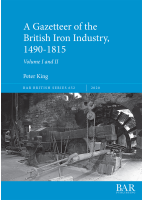Description
A new process of making iron, using a blast furnace and a forge, both powered by water, was introduced into the Weald in the 1490s, and spread to other parts of England and Wales from the 1550s. This book provides a history of every ironworks of the charcoal blast furnace period, except the Weald. It also covers early coke ironworks (built before 1815) and water-powered bloomeries (of the previous technology). After introductory material on the industry generally, each chapter deals with the ironworks of one district, including also other water-powered mills processing iron, steel furnaces, early ironworks powered by steam engines, and a few other works. Blade mills (and cutlers wheels), which provided the initial cutting edge for tools are not included in those areas where they are ubiquitous. The period covered is an era in the technology of an important industry in Great Britain.
This volume is part of a two volume set: ISBN 9781407354637 (Volume I); ISBN 9781407354699 (Volume II); ISBN 9781407315126 (Volume set).
AUTHOR
Peter King obtained a doctorate from Wolverhampton University in 2003 on the Iron Trade. He has spent the last 30 years researching the history of the iron industry and published over 40 articles on this and related subjects. He is an honorary research fellow at the University of Birmingham.
REVIEW
‘This is an extremely important source of reference, and to anyone interested in the iron industry in one region the availability it provides for comparative study of the details of works in other regions is tremendously useful.’ Wealden Iron Research Group Newsletter, Issue 72, Autumn 2020
‘The proposed gazetteer will provide a ready source of reference for a period of significant industrialisation and be of value to any researcher in that field.’ Dr Peter Claughton, University of Exeter‘
[T]he book contributes a great deal to what is known about the early modern iron industry locally, regionally and nationally. I would rate the contribution as very great, and of assistance to anyone in the future investigating the industry at any of those three levels, either empirically or more theoretically.’ Mr Philip Riden, University of Nottingham‘This is a very significant piece of original work. … [The author] has seen beyond the regional borders that limit some previous work.’ Dr Tim Young, GeoArch











